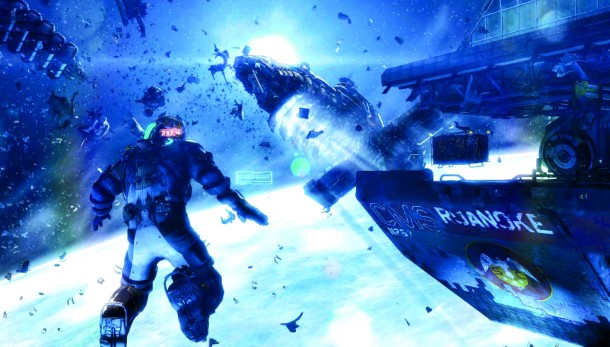Our Verdict
An excellent horror game burdened with action pretensions but it still delivers a fraught, polished experience.
PC Gamer's got your back
Review by Nathan Ditum
On a city street at the start of Dead Space 3, there's a poster for a film called Tools Of Terror. It features a man in a tuxedo pulling a James Bond pose, but instead of a pistol he's holding a wrench. He is, it's fairly obvious, both an action hero and a blue-collar guy, and despite the fact this film is a spoof – or perhaps because of it – he's also an accurate symbolic representation of Dead Space hero Isaac Clarke as he appears in this latest game.
"Isaac was a high-functioning spanner in a space suit."
Isaac is an engineer. It's the thing that made him such an unusual protagonist in the original game – he didn't talk, he fixed things and had weapons that could conceivably have been used to fix things, if they weren't busy dismembering the reanimated dead. He was a high-functioning spanner in a space suit, but he returned the John McClane of religious hysteria and viral outbreaks in Dead Space 2.
How could the same shit happen to the same guy twice? And how could he suddenly be so good at it?
The question was raised: is Isaac best as the handyman-in-a-tight-spot or as the stomping shooter frontman? Dead Space 3 fixes on the elegant solution of pushing him in both directions at once. Progression is dependent on a series of hardware fix-ups – this shuttle, that tram system, this alien genocide machine.
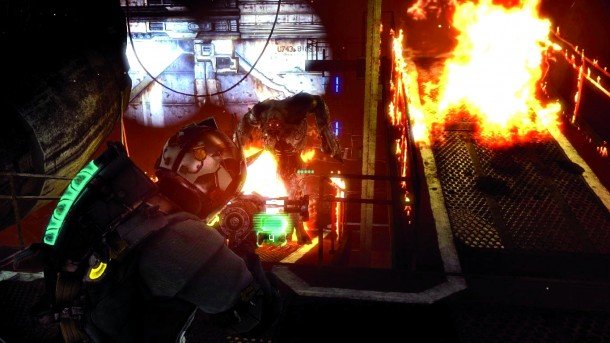
But at the same time, Isaac fights wave after wave of monsters while saying things like, “I turned my back on the world because I couldn't face what had to be done,” – and he's not talking about an oil change or repairing a carburettor.
Keep up to date with the most important stories and the best deals, as picked by the PC Gamer team.
"Should it be a lean horror or an explosive shooter? The game opts to be both."
The debate over Isaac-as-engineer versus Isaac-as-action-hero feeds into Dead Space's genre identity crisis. Should it be a cold, lean horror, or an explosive shooter? The game opts to be both. This is possible because it consists of big, distinct sections: a breathless high-stakes opener (in the James Bond tradition, appropriately enough), a claustrophobic few hours in a debris field of broken ships orbiting a planet, a lengthy action push on the planet's icy surface, and a climactic section in an ancient city.
The segments feel episodic, as though they were built by different teams and bolted together to create a varied, lengthy whole. The first major stop is a floating scrapheap, with Isaac exploring a series of derelicts looking for a way to reach the planet below. It's an expanded echo of the original Dead Space – not just repeating the haunted ship routine, but bringing the quiet, tense and considered approach to a frozen flotilla of craft with Isaac shuttling between them.
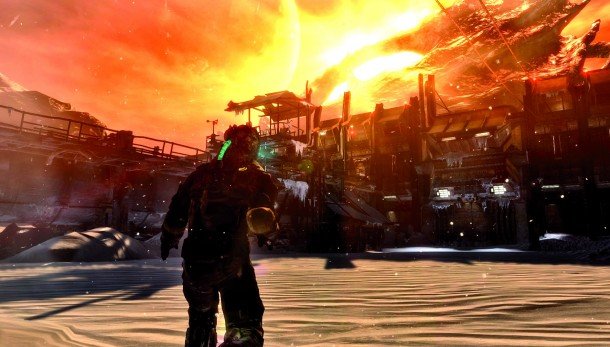
Dusty airlocks and the grand, muffled spectacle of Isaac drifting through space are the foreground to the game's hard sci-fi style, and it fruitfully resurrects the old, effective mix of mundane tasks performed amid calamity. The first moment of dread I've experienced since crawling through the guts of the Ishimura – “but I don't want to find out what's blocking the tram system” – confirms that this is partly the faithful sequel to Dead Space that people who still resent Isaac for learning to talk or daring to display his human face – have been waiting for.
"The game fruitfully resurrects the old, effective mix of mundane tasks performed amid calamity."
A change of pace on the surface of the planet moves Dead Space 3 into more conventional action territory. The snowstorms and wind-battered outposts are a nod to the influence of The Thing on Dead Space, just as surely as the Ishimura paid tribute to the devastation of the Nostromo in Alien, but the combat here introduces elements of cover-based shooting. There are still encounters with skittering necromorphs in corridors and vent-heavy rooms, but there are also more clearings and open spaces, and action set-pieces in the form of cliff-face rappelling (both up and down), boss encounters (tiresome), and an industrial drill that's transformed into a giant rusty flesh-whisk (loud).
It feels as though Dead Space 3 has settled on volume and value as part of a big-fisted approach to appealing to everybody. The game feels laudably substantial, although sometimes the pacing suffers. The inclusion of any level that requires players to double back through a now-repopulated section justifies a call of shenanigans; Dead Space 3 does it more than once. And while the inclusion of optional side-missions is definitely a good thing, not just for the added content but also the opportunity for resource gathering, they can feel at odds with the urgency of the larger objective at hand. Near the close, I was offered the chance to explore one such cul-de-sac, and declined in order to continue my in-progress race against a religious fanatic to reach a control panel in time to prevent the extinction of mankind.
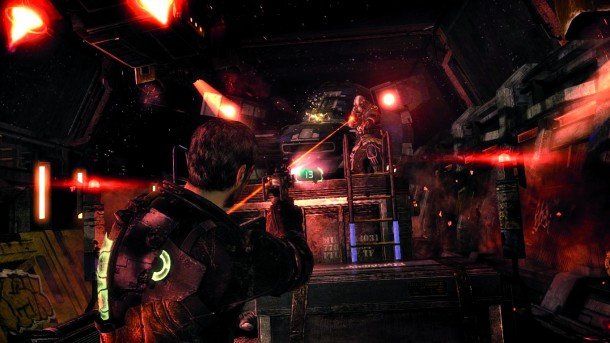
Fighting religious fanatics is a staple of Dead Space 3. The intriguing Unitologist sect, which worships the monolith-like Markers, emerges from shadow and conspiracy to offer all-out war. The result is combat against humans for the first time, and an extension of the split that runs down the centre of the game.
"Dead Space 3 manages what the hapless Aliens: Colonial Marines could not - abundant monsters that are also individually deadly."
Combat against the necromorphs is refined and dangerous. It manages what the hapless Aliens: Colonial Marines could not: abundant monsters that are also individually deadly, thanks to Isaac's accumulated skill set which includes the ability to slow enemies in time, to move and fire small objects with telekinesis, and the need to slice enemies limb by limb in order to despatch them most effectively. It's a layered, satisfying set of systems.
However it's also one clearly designed for a game pad – even with options to customise controls, the need to have fingers hovering over four triggers at once makes a mouse and keyboard unwieldy. In contrast, battles against the Unitologist army offer little except variety and gunfire in stereo. They don't subtract from what might be called the purer Dead Space experience, they just bolt a conventional addition to the side.
The nature of combat is largely determined by the weapons at Isaac's disposal, which in Dead Space 3 come from the bench. The gun crafting is deep and worthwhile, offering a basic choice of weapon type (plasma, laser cutter, military, explosive) before adding variety (modifiers to these types, the ability to combine any two on larger weapon frames) and stat-tweaking and optimisation.
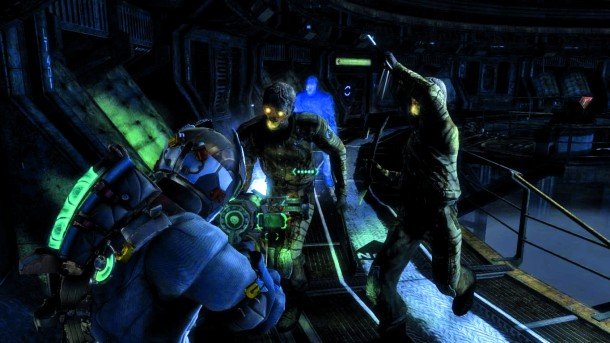
It rewards experimentation and patience, and is paced sensibly enough that the controversial option to buy raw materials through microtransactions never feels imposing – I always had enough to create weapons that felt suitably powerful, and after one run through the game I had the resources to build pretty much anything.
"The effect of co-op is that some sections are a little strung out and lonely in singleplayer."
It's possible to make the same cutting, tearing, flaming tools that have been the series' mainstays, but just as effective now are single-shot weapons with high concentrated damage, and forgiving, spray-and-pray automatic rifles. The basis of Dead Space's combat is a little undermined; de-limbing enemies is a precise, engineer's way to kill space zombies. It sits uncomfortably with the game's own rules that, with damage stats boosted, necromorphs can now be killed with a single sniper shot to the chest.
Also impacting on combat is the addition of co-op. Ironically this makes manifest the split in Isaac's gaming personality – when present, his co-op partner really is a gruff action soldier type, called Carver, the Tyler Durden to Isaac's jittery narrator. Co-op is drop-in, drop-out, with cutscenes shifting to reflect Carver's absence during solo play, the only noticeable effect being that some sections are a little strung out and lonely in singleplayer.
Whether it suits a horror game is a moot point: given Dead Space 3's efforts to provide both scares and thrills, the impact of co-op is negligible. But it does change the combat, in entirely positive ways. Working together is fun: trapping enemies in stasis for your partner, or rescuing them from pinned execution, and planning what complementary set of weapons to use as a pair. As with the others in the series, Dead Space 3 positively encourages post-completion playthroughs on higher difficulties and with tougher restrictions.
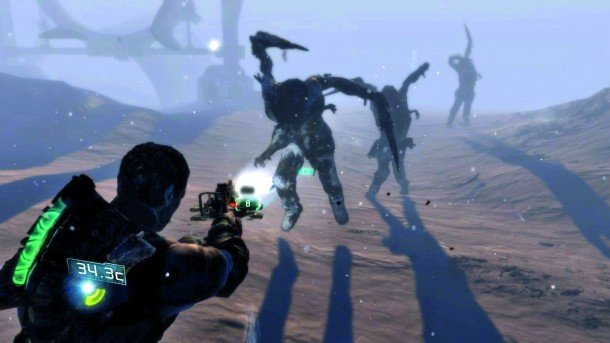
In terms of performance, Dead Space 3 ran without a hitch on an i5 processor-equipped rig with 8GB of RAM and an Nvidia Geforce 560 Ti. Before release, Visceral Games spoke about their aim to create a uniform experience across console and PC, which raised legitimate concerns that the PC version would be a horrendous port. It's not quite that bad; custom render settings are available from the in-game menu to control various effects like bloom, glow, SSAO, depth of field, and it does look prettier than console versions. I played on 1920 x 1080 with no impact on framerate, which was locked at a steady 30fps – something that can be unlocked with some VSync tweaking.
"It delivers an uncompromised, high-quality horror game."
If this 'uniform' approach is slightly disappointing, it's absolutely in keeping with Dead Space 3's comprehensive, please-all approach. The game tries hard to be all things to all men (ironic, considering it features a religion with the ultimate objective of making all men into one giant thing). It's accomplished, it looks wonderful, and delivers an uncompromised, high-quality horror game. It's just that it's so big that it delivers a less compelling shooter title as well.
This is perhaps the inevitable reality of creating a searing, stylish new IP – that two sequels down the line, the need to maximise appeal has turned everything great about that game into the still-beating heart of a commercial machine augmented with features, an appealing hero, and explosive moments. Dead Space 3 is still good, and it's still Dead Space. It's just lots of other things as well.
An excellent horror game burdened with action pretensions but it still delivers a fraught, polished experience.
PC Gamer is the global authority on PC games—starting in 1993 with the magazine, and then in 2010 with this website you're currently reading. We have writers across the US, Canada, UK and Australia, who you can read about here.
